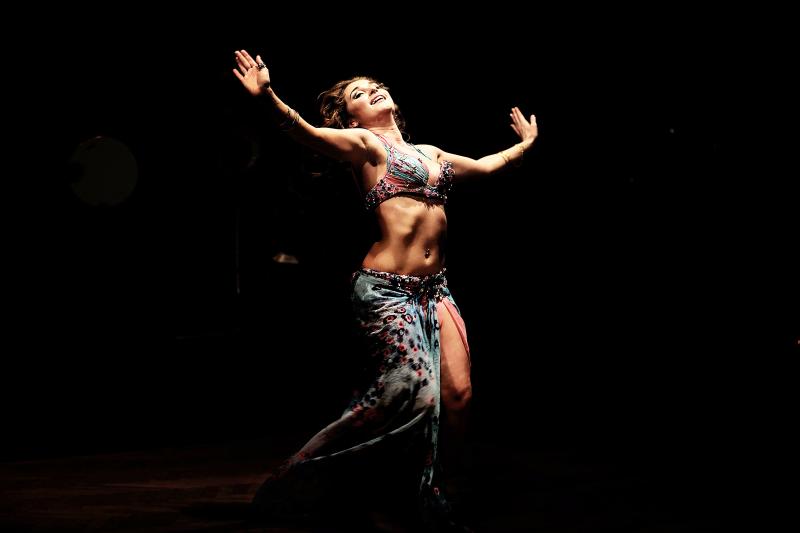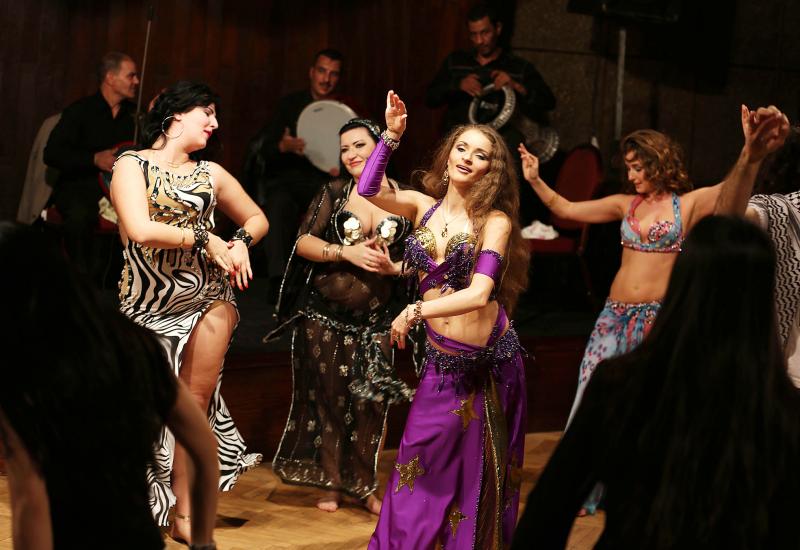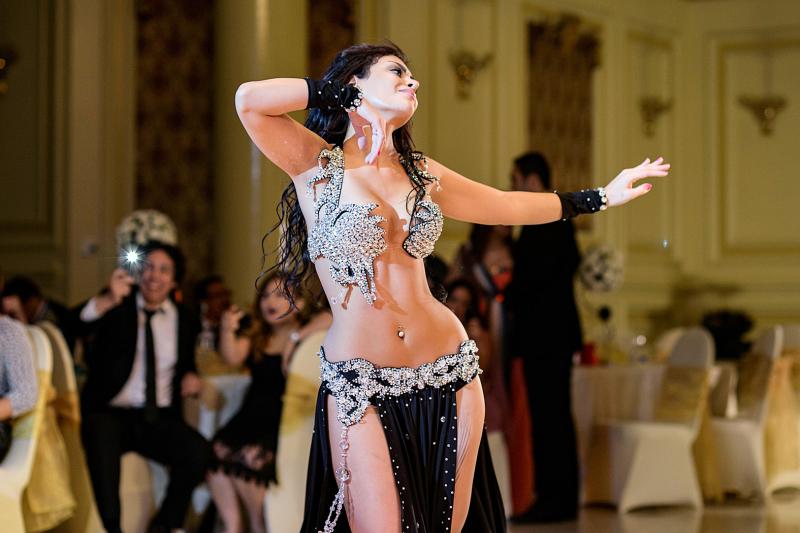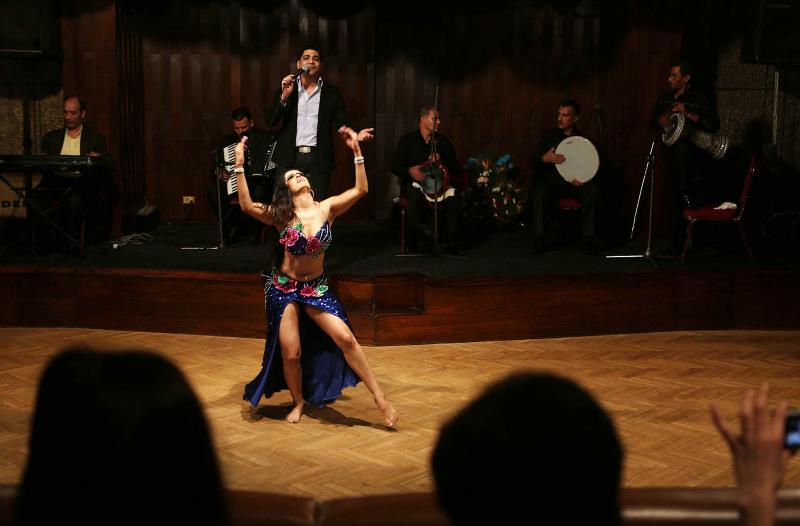As a trickle of tourists slowly returns to Egypt, the floating nightclubs along the Nile are back in business.
And belly dancers are once again in high demand. The glitzy late-night shows attract visitors from all over the world, and especially from the Gulf’s Arab states, with dancers in revealing outfits performing with full traditional musical backing.
But while many dancers are happy to be getting back to work, there is growing disquiet that the artform is becoming closely associated with drinking and nightclub culture. They feel that the belly dance, which is deeply rooted in Egyptian history, has been increasingly seen as more akin to strip dancing, and that this association is making life difficult for the dancers.

Photo : AP
“What we’re seeing more and more of is this dance being hidden in these underground cabarets and bars,” says Egyptian dancer Amie Sultan. “A normal Egyptian family who wants to go to the theater and watch a show will never see this dance.”
As part of a campaign to change perceptions of the traditional artform, Sultan has launched a bid to have Egyptian belly dance included on UNESCO’s Lists of Intangible Cultural Heritage.
Although the dance is hugely popular — it is common to see belly dancers at Muslim and Christian weddings and star performers are celebrities in their own right — Sultan says they are seen more often as sex workers than artists. In Egypt’s conservative society, dancers face intense social stigma, and even risk prosecution for wearing outfits deemed too promiscuous by the authorities.

Photo : AFP
“A mother will hire a dancer for her son’s wedding,” Sultan says, “but she’ll never let her daughter become a dancer.”
CULTURE SHOCK
Born in Singapore, Sultan began her dancing career in ballet. When she moved her focus to belly dance in 2014, she was shocked by a culture where performers compete to wear more revealing costumes and often undergo cosmetic surgery and breast augmentations.

Photo : AFP
“I don’t even like the term ‘belly dance,’” says Sultan, who now teaches what she prefers to call Egyptian dance.
Belly dance, she says “is a term that was invented by the French colonialists in Egypt. They took it back to France and called it danse du ventre (dance of the stomach), but we never call it that in Arabic.”
Her program for young dancers is run along similar lines to ballet training. Students are taught to dance in the style of stars from Egypt’s “golden age” of cinema, such as Samia Gamal and Naima Akef, and to distance themselves from the more sexualised styles found in nightclubs, where Sultan says the traditions have been diluted with other dance styles.

Photo : AFP
Associating belly dance with sex work can make life difficult for dancers. Women trying to break into it as a career risk alienation from their families, insecure accommodation at the mercy of suspicious landlords, and sexual harassment.
Unscrupulous managers have been known to push dancers into sex work.
Dancers can also fall foul of the government’s strict regulations on attire. In 2019, a Russian woman was sentenced to a year in prison for breaching the dress code.
STIGMATIZED
Dance teacher Ali Abdelfattah says belly dancers are stigmatized in a way that doesn’t affect other professional dancers. “The ballet is seen as something graceful,” he says, “but when people see belly dancers, it throws up a lot of question marks. It’s not a good image.”
Abdelfattah says that most of his students attend his workshops without their families’ knowledge.
Because of the difficulties faced by Egyptians, many of those dancing in clubs, cabarets and at weddings come from abroad, especially from Russia and South America. Lurdiana, a Brazilian dancer working in Cairo, says she was recruited to belly dance in Sharm el-Sheikh. “They need dancers here,” she says.
Even within the industry, Egyptian dancers face difficulties. Lurdiana’s former manager once explained his preference for foreign dancers.
“He said that if an Egyptian girl works as a belly dancer, it means she doesn’t come from a good family or have a good education,” she says. “They think that she just does it because she wants to get money and doesn’t have any other options. They can’t imagine that she would do this just because she loves it.”

Taiwan has next to no political engagement in Myanmar, either with the ruling military junta nor the dozens of armed groups who’ve in the last five years taken over around two-thirds of the nation’s territory in a sprawling, patchwork civil war. But early last month, the leader of one relatively minor Burmese revolutionary faction, General Nerdah Bomya, who is also an alleged war criminal, made a low key visit to Taipei, where he met with a member of President William Lai’s (賴清德) staff, a retired Taiwanese military official and several academics. “I feel like Taiwan is a good example of

March 2 to March 8 Gunfire rang out along the shore of the frontline island of Lieyu (烈嶼) on a foggy afternoon on March 7, 1987. By the time it was over, about 20 unarmed Vietnamese refugees — men, women, elderly and children — were dead. They were hastily buried, followed by decades of silence. Months later, opposition politicians and journalists tried to uncover what had happened, but conflicting accounts only deepened the confusion. One version suggested that government troops had mistakenly killed their own operatives attempting to return home from Vietnam. The military maintained that the

Jacques Poissant’s suffering stopped the day he asked his daughter if it would be “cowardly to ask to be helped to die.” The retired Canadian insurance adviser was 93, and “was wasting away” after a long battle with prostate cancer. “He no longer had any zest for life,” Josee Poissant said. Last year her mother made the same choice at 96 when she realized she would not be getting out of hospital. She died surrounded by her children and their partners listening to the music she loved. “She was at peace. She sang until she went to sleep.” Josee Poissant remembers it as a beautiful

Before the last section of the round-the-island railway was electrified, one old blue train still chugged back and forth between Pingtung County’s Fangliao (枋寮) and Taitung (台東) stations once a day. It was so slow, was so hot (it had no air conditioning) and covered such a short distance, that the low fare still failed to attract many riders. This relic of the past was finally retired when the South Link Line was fully electrified on Dec. 23, 2020. A wave of nostalgia surrounded the termination of the Ordinary Train service, as these train carriages had been in use for decades